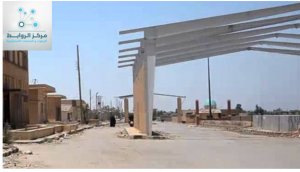As the confrontation between Washington and Tehran escalates elsewhere in the Arabian Gulf, the latter – Tehran – gives high priority to its attempts to secure its control over al-Bukamal border crossing in Qaim and reopening it, as news and intelligence reports indicate Baghdad’s efforts to the restart al-Bukamal border crossing between the two sides which has reached an advanced stage in preparation for its opening soon.
The road that runs through the crossing connects the two countries, coming from Baghdad towards Fallujah, Ramadi, Hit and Haditha to reach the Qaim. Then, it enters Syria, heading north towards the city of Mayadin and then Deir Al-Zour. It is divided into two roads, one towards Aleppo and Latakia on the Mediterranean Sea, and the other is heading South, passing through the towns of Kabbaj and Al-Sokhna in the Syrian Badia, then the city of Palmyra, and it is divided in two roads, one towards Al-Farkalis and then the city of Homs, and the other is heading towards eastern Kalamoon of Reef Damascus to reach the Syrian capital where it is linked to international roads linking Damascus to Lebanon and southern Syria
The Israeli site “imagesatintl” published images of modern satellites for a new land crossing which the Syrian regime and Iraq are preparing to open. According to the photographs published on Thursday, July 25, the new crossing will be built in facilities according to standards similar to those in international border standards. The new crossing is located outside the city of Albukamal, unlike the old crossing which was passing through it. The new crossing is 2.6 kilometers from the old one, whose fate is still unclear, while the Israeli site expects to have plans to use it as an additional or alternative crossing.
Given the importance of this important step in strengthening the political, economic and security relations between Iraq and Syria, the Iraqi government is under intense pressure from Iran, which seeks to accelerate the opening of the border port, and the United States of America, which refuses, and these pressures made the Iraqi government at a loss, How it can reconcile the two contradictory positions, no doubt it is a very difficult task if not impossible.
The opening of the crossing is of importance to the three countries, Iran, Syria and Iraq. It is an exceptional position for Tehran, which is facing the second US sanctions package, which came into force on November 5, mainly involving the oil and banking sectors, and Tehran is working to open an outlet for it from the sanctions via countries with influence in the middle east , specifically Iraq , although the latter was officially announced last August by his former prime minister, Haider al-Abbadi, that “in principle, we are against sanctions in the region, but we will abide by it to protect the interests of our people. ”
Undoubtedly the opening of the Iraqi-Syrian border is of great benefit to Iran and its ally the Syrian regime. Economically, Iran may use this crossing in cooperation with Iraq and Syria to alleviate the economic sanctions imposed by the administration of US President Donald Trump, Iran through which can smuggle oil and all its derivatives , and thus can obtain some of the funds necessary to limit the impact of economic sanctions on it, and through which Iran can also send to its ally in Syria and the other Hezbollah in Lebanon all the military support they need, and the opening of this crossing also makes it easy for Qasim Soleimani to move from Iran through Iraq to Syria to follow up its armed groups there , which means in one way or another circumventing the policy of US sanctions on Iran, which has so far proved successful in various maritime areas. The failure to open the al-Bukamal border crossing means for the administration of US President Donald Trump, further isolating Iran regionally and internationally.
This US position is shared by the Arab states and Israel, as they are afraid of reopening the al-Bukamal crossing because opening it as a lifeline for both Iran and Syria, and not opening it for Syria means further tightening of the screws on it, because Syria and have only the road to communicate between them after American and Western air and sea censorship on them.
Therefore, Iran is working hard to maintain the al-Bukamal border crossing under its control, with the aim of strengthening its influence in the Middle East and easing the impact of US sanctions.
The question arises in this context: How will the administration of US President Donald Trump respond to the political, military and economic message of opening the al-Bukamal crossing?
Iraqi Studies Unit
Rawabet Center for Research and Strategic Studies

